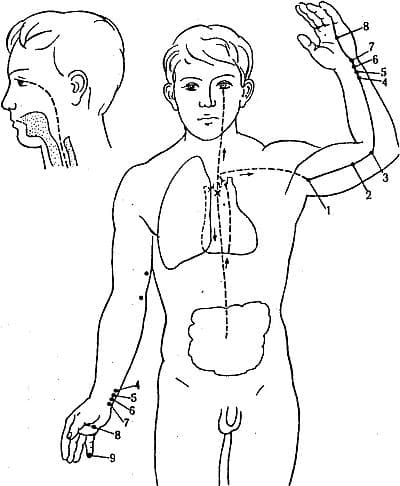
The Heart Meridian (C)
The Heart Meridian belongs to the system of Yin meridians. Its pair is the meridian of small intestines, and its element is fire. It receives energy from the meridian of the spleen (pancreas) and transmits it to the meridian of the small intestine, manual, 9 points. The maximum activity time of the channel is from 11 to 13 hours, the minimum activity time is from 23 to 1 hour.
Functions of The Heart Meridian
The physiological function is blood pumping. He oversees consciousness — the activity of thinking, the work of the psyche. The diagnostic key is the language. Responsible for the blood vessels and its reflection shine on the face. He oversees sweating, is responsible for the transportation of blood. Paired and closely related to it is the meridian of the small intestine.
It originates in the armpit area, then descends along the inside of the shoulder, elbow joint, forearm, then passes through the palm and ends at the nail on the inside of the little finger.

Symptoms and Diseases Related to the Imbalance of the Heart Meridian
A sign of redundancy
Pain in the heart, pain in the shoulder girdle, pain in the forearm, a feeling of heaviness in the chest and limbs, a hyperemic face, sometimes fever, increased excitability, possibly dry mouth.
A sign of insufficiency
Shortness of breath during physical exertion, palpitations, feeling of depression, feeling of fear, sad mood, pale face, numbness of the inner surface of the shoulder, dizziness due to insufficient blood circulation.
Diseases of The Heart Meridian
Diseases associated with the meridian of the heart: pain in the heart and left arm, functional disorders of cardiac activity, cardiac arrhythmia, hypertension, vascular diseases, anxiety, stress, emotional overload, hypotension, heart attacks, hepatitis, cholecystitis, depression; nausea, jaundice of the sclera; pain in the shoulder and elbow joints, pain in the hypochondrium, restriction of movement in the shoulder joint sudden loss of voice; pain in the forearm, neuritis of the ulnar nerve; obsessive feeling of fear, insomnia, feverish states, feeling of anxiety, neurogenic pain in the heart; headache, tinnitus, dizziness, eye pain, asthenia phobias, memory impairment; vomiting with blood, hemoptysis, palpitations, suffocation, convulsive contraction of fingers; vaginal and uterine prolapse, pain and itching in the perineum; urinary retention or incontinence; anxiety disorders of cerebral circulation, loss of consciousness.